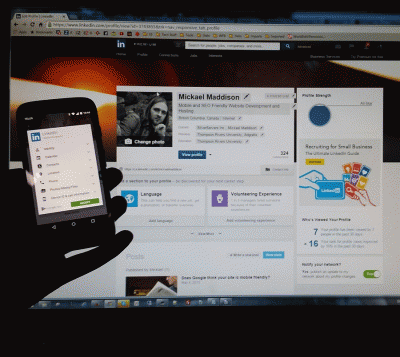Mobile Apps vs Mobile Websites - Facebook and Linked-In Weigh In
July 15th 2015

The news that Linked-In and Facebook are moving away from using a responsive design website to focusing on mobile apps is being touted by website and UX designers as evidence that mobile websites are not as effective as apps. In their stats only 27% of mobile users were happy to use mobile websites over native apps. On the surface that would look like a pretty clear cut indication to forget about the mobile friendly responsive design website and pony up the cost for mobile app development; but what if those stats are misleading?
First, let's look at the most popular apps. According to Business Insider the top 10 apps of 2014 are Facebook, Google Search, YouTube, Google Play, Google Maps, Gmail, Facebook Messenger, Google+, Instagram, iTunes.
What seems obvious here, is that the top 10 apps are amongst the 10 most popular uses of a mobile device. Folks like to participate in social media such as Facebook and Instagram all day long while listening to music. We also like to use our mobile devices for things like texting, talking and taking photos. If we consider all of these "competitors" to mobile friendly websites, then it would not be surprising to see statistics saying that less than 10% of mobile device usage is from websites. Does that mean mobile users don't like using websites for anything, or that for social media, phone, text and photography are simply better served in an app environment? Perhaps the statistics as presented are relevant to your business if you are producing a social media platform or some unique application. If your business is like most product or service industries out there, these statistics may be misleading.
The same kind of argument could apply to computers. How many people use webmail vs. people that use programs like Mac Mail, Outlook or Thunderbird? The fact that many users use email programs does not in any way mean websites have less value. On desktops and laptops we also use programs like Skype for chatting, Libre Office or Microsoft Office for creating spreadsheets and documents as well as Adobe Creative Cloud for media creation. These things "can" be done through a web browser, but we already know and accept that we like to use Excel to create and use a spreadsheet on our computer more than we like to go to Google Sheets. If we looked at computers and laptops in the same way, would we be saying websites have more or less value than computer software? By this time we have all come to accept that software applications and websites are, for the most part, 2 separate niches.
It is clear that native apps may be used more on todays mobile devices than browsers going to websites. It is also makes sense that if you want to go on Facebook or Linked-In every day, having the app running constantly on your phone would make it quick and convenient. Mobile friendly websites show their stuff when people visit the number 2 app - Google Search. This proves that people on mobile devices are using the web to great purpose. It's a growing trend and Google has made it clear that they expect mobile website traffic to continue to grow by leaps and bounds. So, before we start telling all of our clients to drop their websites and jump onto the mobile app bandwagon, I think we need to take a careful look at what you're trying to achieve with your online presence.
Contact SilverServers today to learn more about mobile-friendly, responsive website design, or read more of our articles about website design!


